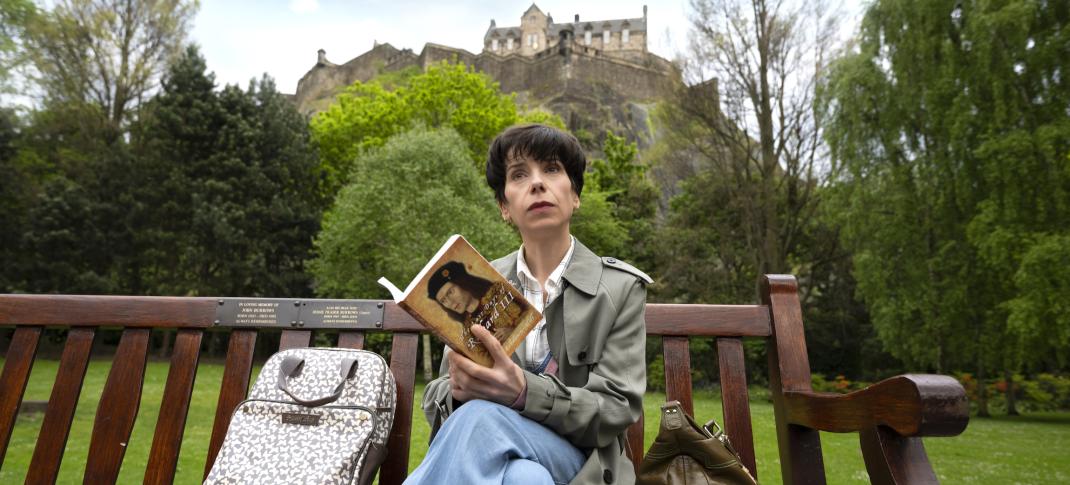British Movies: 'The Lost King' Is a Heartwarming Piece of Plantagenet Propaganda

Sally Hawkins in "The Lost King"
(Photo: IFC Films)
Everyone knows the story of King Richard III. Or, at least, they think they do. Thanks to William Shakespeare and his dark history play about the doomed monarch, everyone remembers Richard as a monster, a villain with a deformed body to match his dark heart. A usurper who murdered his nephews to claim a crown and solidify his own power, he's a man who almost certainly got what he deserved on Bosworth Field.
Or did he? What if none of those stories about Richard are true? History is written by the winners, after all, and Shakespeare's play was penned more than a century after the last Plantagenet king was dead and gone. And heck, it sure would have made life a lot easier for King Henry VII and the Tudor family line if everybody believed him to be the welcome overthrower of a hated tyrant rather than a fourth-tier cousin who killed a distant relative in the name of satisfying his ambition, wouldn't it?
These are just some of the questions posed by The Lost King, a charming British film that dramatizes the fascinating search for Richard Plantagenet's grave and the life of the amateur historian who devoted herself to proving the conventional wisdom about the allegedly crookbacked-king false. A sweet, gentle movie that is a story of second chances (both in life and death); as much as it is a tale of the man Richard III might have been, it's an easy, briskly paced ride grounded in genuine emotion. Is it, in its way, as much of a piece of propaganda as the Shakespeare play that insists on Richard's monstrous nature? Perhaps. After all, it's probable that the most likely truth of the man lies somewhere in the middle of these two interpretive extremes, and he was neither a hero nor a devil, if we want to be super technical about it. But, given the anti-Ricardian sentiment that has dominated historical discourse for centuries, it's nice to see a different perspective represented.
The Lost King stars Oscar nominee Sally Hawkins (The Shape of Water) as Phillippa Langley, a divorced, chronically ill mother of two who lives in Edinburgh and shares childcare duties with her ex-husband John (Steve Coogan). She struggles with ME, or Chronic Fatigue Syndrom, a condition that often causes her to miss work, and a trip to a local production of Shakespeare's famous play sparks what will rapidly become an obsession with the monarch that ultimately changes both her life and British history.
Based on the book The King's Grave: The Search for Richard III, which the real Langley herself co-wrote with Michael Jones, the film chronicles the story of her dogged search for the dead king's final resting place, a journey that takes her to both meetings of the local Richard III Society and the halls of academia itself, culminating in the near-miraculous discovery of his royal remains buried underneath a car park in Leicester. (She and her team also discovered the remains of Greyfriars Church, which is also extremely cool if slightly less historically impactful.)
But the true charm of the movie, of course, lies in its heart, in its central story of a woman who finds her voice, learns to trust herself, and forces those who would consider themselves above her (from city leaders to famous academics) to listen to her and take her seriously. As she starts seeing visions of Richard III (Harry Lloyd) around town, a sort of imaginary cheerleader encouraging her to trust her instincts and assuaging her doubt, she becomes more confident in her beliefs and abilities. Richard — or rather the idea of Richard — becomes something of an emotional touchstone for Phillippa, who resents the fact that his perceived villainy is so closely tied to the idea of his physical appearance, specifically a physical disability he may or may not have possessed.
For those of us who have long been Richard III enthusiasts — I refer to myself as a York apologist in my bio for this very website! — it's also highly satisfying to hear the pro-Ricardian side presented with forthright enthusiasm and unapologetic belief. And The Lost King does a rather excellent job of laying out the main arguments against the conventional understanding of who Richard likely was.
There's no evidence he murdered the infamous princes in the Tower. Killing two of his nephews when his older brothers had several other children besides young Edward and Richard means their deaths wouldn't have even fully solidified his power. (Fun fact: Henry VII does have several children murdered for his own benefit during his reign, including the eldest son of Richard's older brother, George, Duke of Clarence, in an all-time example of people in glass houses throwing stones.)
No contemporary sources describe him as ugly, possessing a hunchback, or having another horrifying physical deformity of some type (his bones ultimately revealed him to have scoliosis, which is not the same thing.) And his reign, short as it was, was remarkably progressive. It turns out he was not hated by the public the way the Tudors would later come to claim. Richard encouraged foreign trade, bolstered the printing industry, and had a particular zeal for judicial reform, most notably designed to aid the poor in the task of seeking justice.
None of this means Richard Plantagenet was an admirable man or even a particularly great king. But that's not what The Lost King is trying to do. Instead, the film seeks to put him and his life in context in a way that our kneejerk societal need to believe in the idea of him as one of history's greatest villains often precludes us from doing.
Yes, the film speed runs through many of the intricacies involved in Phillippa's search for Richard's gravesite — in real life, it took her the better part of a decade to plot out where Greyfriars had most likely been located, rather than the swift ten minutes it all seems to unfold onscreen. But Hawkins' luminous performance is so good that Phillippa's steadily growing confidence and certainty in her choices is both apparent and utterly charming. It's hard not to embrace her crusade, particularly when she runs headlong into a group of (male) academics who seem eager to horn in on her work once it starts bearing literal history-changing fruit.
A David and Goliath story for British history buffs, The Lost King is a sweet, gentle celebration of a woman who never gave up and a king whom history did dirty. And the result is the kind of historical propaganda I'm more than happy to live with.
The Lost King is now streaming on AMC+ and Acorn TV.







